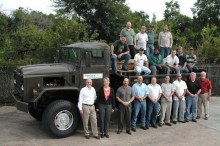 Yesterday, I described the difficulty that people recovering from problem drug use face in becoming accepted by mainstream society. They are shunned and socially excluded at a time they need to reintegrate into mainstream society in order to facilitate their recovery and allow them to live a normal life. Here is a related story.
Yesterday, I described the difficulty that people recovering from problem drug use face in becoming accepted by mainstream society. They are shunned and socially excluded at a time they need to reintegrate into mainstream society in order to facilitate their recovery and allow them to live a normal life. Here is a related story.
Early in February 2008, I attended with my colleagues Lucie James and Kevin Manley, the first Drink and Drugs News (DDN) / Alliance Service User Conference, which was organised by Claire Brown and Ian Ralph of DDN and held in Birmingham. Around 500 people attended, two-thirds of them service users, a very successful conference.
Lucie, Kevin and I enjoyed our day and made some new friends. A special issue of DDN, which was the leading UK magazine focused on drug and alcohol treatment, was devoted to the conference. Prejudice towards service users was obviously an issue that was discussed during the afternoon’s discussion tables.







